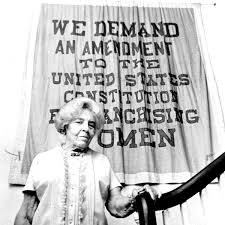This news story was published on Democracy Now’s website on May 8th, 2019.
A brief commentary by Paul Cienfuegos, Community Rights US Founder and Director:
We are the only nation with a modern constitution in the entire world that does not guarantee equal rights for men and women. Yet, corporations have been gaining constitutional rights since 1819! Corporations won equal protection and due process under the 14th Amendment in 1886. Women finally won 14th Amendment protections in 1971 in Reed v. Reed. Imagine how different our society might have turned out if women’s rights had been properly protected early in our history, rather than corporate “rights”. Here’s a very abbreviated chronology that I have assembled, of major historical moments in our nation’s history, followed by some very big and exciting news about a new national campaign to finally add an Equal Rights Amendment to the US Constitution.
1769 – The colonies adopt the English system decreeing women cannot own property in their own name or keep their own earnings.
1787 – The Constitutional Convention places voting qualifications in the hands of the states. Women in all states except New Jersey lose their right to vote. New Jersey finally bans voting by women in 1807.
1866 – The 14th Amendment is passed by Congress, with “citizens” and “persons” defined as “male” in the Constitution.1868 – Black males become persons with equal protection and due process when the 14th Amendment is ratified.
1870 – Black males win the right to vote when the 15th Amendment is ratified.
1873 – The Supreme Court rules that a state has the right to exclude a married woman from practicing law.
1874 – The Supreme Court hears the case Minor v. Happersett, where women argued that under the 14th Amendment’s Equal Protection clause, their right to vote could not be denied. The Court rejects this argument, claiming that the word “person” was only intended to apply to black males.1886 – The Supreme Court hears the case Santa Clara County v. Southern Pacific Railroad Company, which for the first time grants “personhood” to business corporations, under the 14th Amendment.
1886 – The Supreme Court hears the case Santa Clara County v. Southern Pacific Railroad Company, which for the first time grants “personhood” to business corporations, under the 14th Amendment.
1890 – The first state (Wyoming) grants women the right to vote in all elections.
1893 – For the first time, corporations have claim to the Bill of Rights, when the Supreme Court grants them “personhood” under the 5th Amendment.
1906 – Corporations get 6th Amendment right to a jury trial in a criminal case. (Women do not yet have this same right.)
1920 – The Nineteenth Amendment to the Constitution is ratified, ensuring the right of women to vote, after 75 years of struggle.
1923 – The first version of an Equal Rights Amendment is introduced (but is defeated). It says, “Men and women shall have equal rights throughout the United States and every place subject to its jurisdiction.”
1963 – The Equal Pay Act is passed by Congress, promising equitable wages for the same work, regardless of the race, color, religion, national origin or sex of the worker. (The Act fails to achieve its goals.)1971 – Women finally win the 14th Amendment – equal protection and due process – 85 years after corporations win this Amendment – in Reed v. Reed.
1973 – Supreme Court ruling Roe v. Wade makes abortion legal in the first trimester of pregnancy, based on a woman’s 9th and 14th Amendment rights (to privacy). This decision now hangs by a thread in 2019.
1975 – The Supreme Court denies states the right to exclude women from juries.
1982 – The Equal Rights Amendment falls short of ratification (by just three states)
1984 – The state of Mississippi belatedly ratifies the 19th Amendment, finally granting women the vote.
2019 – A new national campaign launches to finally get the Equal Rights Amendment fully ratified and placed into the US Constitution. Only one more state is required for passage. (See the story that follows for more details.)
From Democracy Now – Activists and lawmakers testified last week before a House Judiciary subcommittee in the first congressional hearings on the Equal Rights Amendment in more than 35 years. The constitutional amendment was approved by Congress in 1972, and was ratified by 35 states over the next decade — three states short of the required total needed by a 1982 deadline. Nevada and Illinois have since ratified the amendment. A bill by Rep. Jackie Spear would eliminate the 1982 deadline, leaving the ERA just one state away from becoming a part of the U.S. Constitution. We speak with co-presidents and CEOs of the ERA Coalition/Fund for Women’s Equality: Carol Jenkins and Jessica Neuwirth. Neuwirth is also the author of the book “Equal Means Equal: Why the Time for an Equal Rights Amendment is Now.”
(To read, listen, and watch this news story please click HERE.)

